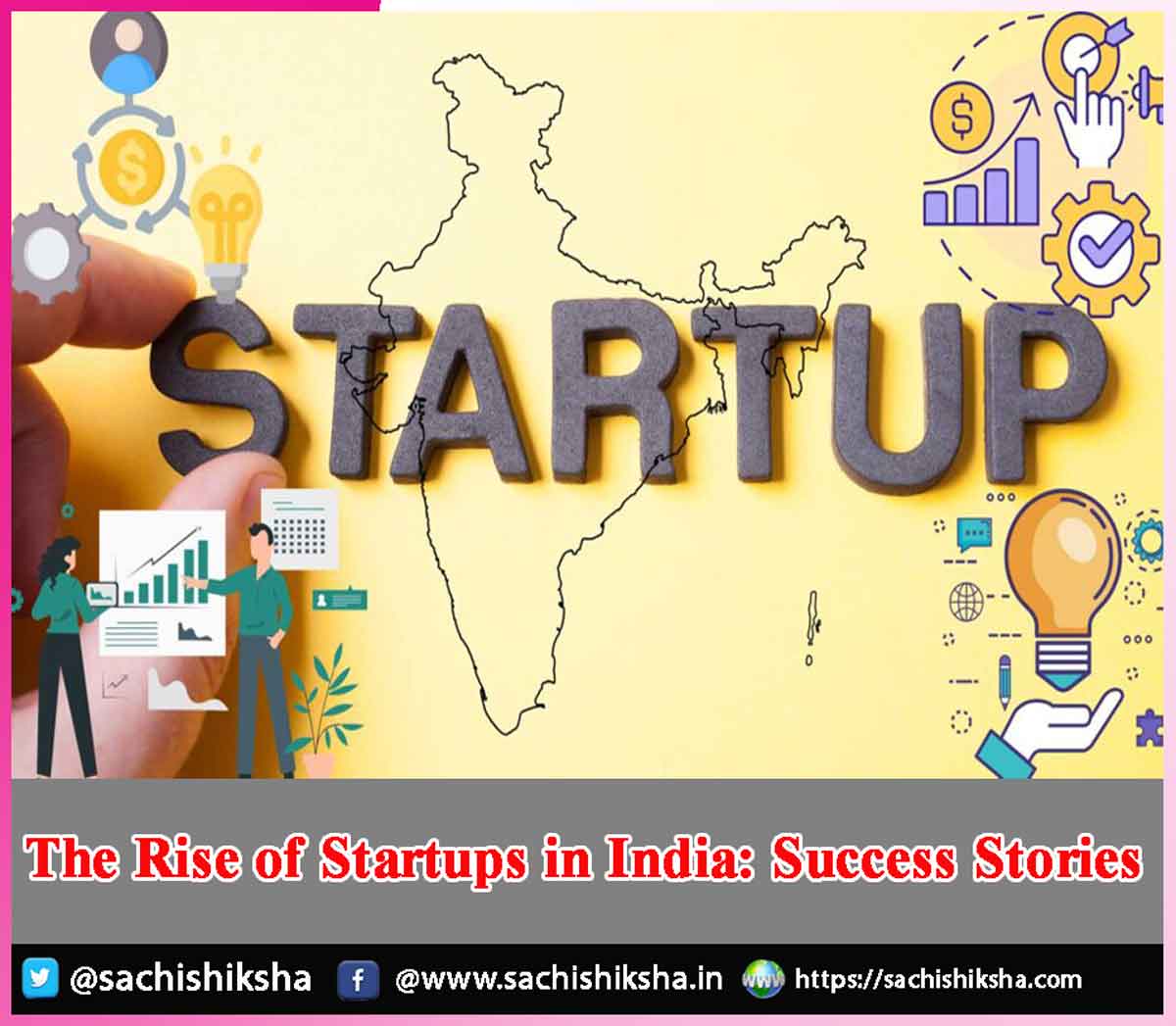The Rise of Startups in India: Success Stories
Introduction: India, once predominantly known for its agricultural and service-based economy, has undergone a transformative journey over the past two decades. Today, the nation stands as the third-largest startup ecosystem in the world, trailing only behind the United States and China.

Table of Contents
The Startup Boom: A Timeline of Growth
The early 2000s laid the foundation for India’s startup ecosystem. With the IT revolution gaining ground and global outsourcing becoming a major industry, cities like Bengaluru, Hyderabad, and Pune emerged as tech hubs. However, the real acceleration came post-2010, thanks to a confluence of factors:
- Increased Internet Penetration: The launch of affordable smartphones and widespread internet access, particularly with the advent of Reliance Jio in 2016, created a massive digital consumer base.
- Government Initiatives: Programs like Startup India, launched in 2016, provided tax exemptions, funding support, and ease of business initiatives that encouraged entrepreneurship.
- Availability of Venture Capital: Indian startups began attracting significant domestic and international investments. Global VC firms such as Sequoia Capital, Accel Partners, and Tiger Global entered the Indian market aggressively.
- Youth Demographic Advantage: With over 65% of the population under the age of 35, India has a large pool of tech-savvy, ambitious youth.
Sectors Fueling the Startup Surge
Indian startups have flourished across a variety of sectors. Key industries include:
- Fintech: Revolutionizing the financial landscape with platforms like Paytm, PhonePe, and Razorpay.
- E-commerce: Flipkart and Myntra made online shopping a household concept.
- Edtech: Byju’s, Unacademy, and Vedantu turned learning into a digital, accessible service.
- Healthtech: Practo and 1mg redefined digital healthcare services.
- SaaS (Software as a Service): Companies like Freshworks and Zoho have become global names.
- Agri-tech, mobility, gaming, and AI: These sectors are also rapidly emerging as hotbeds of innovation.
Success Stories: Icons of Indian Startups
-
Flipkart
Founded in 2007 by Sachin and Binny Bansal, Flipkart started as an online bookstore. Operating from a small apartment in Bengaluru, the duo gradually expanded into multiple categories. Flipkart introduced features such as cash on delivery and easy returns, transforming the way Indians shop online.
In 2018, Walmart acquired a 77% stake in Flipkart for $16 billion—marking one of the biggest deals in India’s startup history. Flipkart’s success proved that Indian companies could build at scale and compete with global giants like Amazon.
-
Paytm
Vijay Shekhar Sharma’s brainchild, Paytm, started in 2010 as a mobile recharge platform. It evolved into a full-fledged digital wallet and financial services provider, enabling millions of Indians to embrace digital transactions. The demonetization in 2016 gave Paytm massive momentum, making it a household name.
Paytm’s IPO in 2021 was one of India’s largest, although it faced stock volatility. Despite ups and downs, it continues to be a cornerstone of India’s fintech ecosystem.
-
Byju’s
Founded in 2011 by Byju Raveendran, a former teacher, Byju’s transformed from a test-prep coaching center to one of the world’s largest edtech platforms. Byju’s content-rich, interactive learning methods appealed to millions of students across India and abroad.
The pandemic served as a catalyst for online education, further boosting Byju’s growth. It acquired several companies including WhiteHat Jr, Toppr, and Aakash Institute, expanding its reach and offerings.
-
Zerodha
Nithin and Nikhil Kamath launched Zerodha in 2010 with a simple idea—making trading accessible and affordable. At a time when stock trading was dominated by traditional brokers charging high commissions, Zerodha introduced a discount brokerage model.
With its user-friendly interface and low fees, Zerodha attracted a new generation of investors. Remarkably, it became one of India’s most profitable fintech firms without relying on external funding—a rare feat in the startup world.
-
Freshworks
A true SaaS success story, Freshworks was founded in Chennai by Girish Mathrubootham in 2010. It provides cloud-based customer engagement solutions to businesses across the globe.
In 2021, Freshworks became the first Indian SaaS company to list on NASDAQ. Its IPO was a landmark moment, highlighting India’s potential to produce globally competitive software products.
Government Support and Regulatory Evolution
The Indian government has taken proactive steps to nurture the startup ecosystem:
- Startup India initiative: Offers tax benefits, easier compliance, and fast-tracked patent applications.
- Fund of Funds for Startups (FFS): A corpus of ₹10,000 crore managed by SIDBI to support startups through venture funds.
- Digital India: Promoting digital infrastructure, digital literacy, and e-governance.
- Atal Innovation Mission (AIM): Encouraging innovation through Atal Tinkering Labs and incubation centers.
Additionally, various state governments—such as Karnataka, Maharashtra, and Telangana—have their own startup policies and support systems.
Challenges Faced by Indian Startups
Despite the progress, startups in India face numerous hurdles:
- Regulatory Complexity: Policies across states vary, and bureaucratic red tape can hinder progress.
- Funding Gaps: While early-stage funding is increasing, access to growth and late-stage capital is still challenging for many.
- Talent Acquisition: High attrition rates and competition for skilled talent, especially in tech, pose challenges.
- Sustainability and profitability: Many startups struggle to balance growth with sustainable unit economics.
Yet, these challenges have fostered innovation, compelling startups to think creatively and optimize for scalability.
The Unicorn Boom
India is witnessing an explosion in the number of unicorns—startups valued at over $1 billion. As of early 2025, India boasts over 120 unicorns across sectors like fintech (CRED, Razorpay), logistics (Delhivery), mobility (Ola), and enterprise tech (BrowserStack). This surge is a testament to the global confidence in Indian entrepreneurship.
Interestingly, many of these unicorns have roots in tier-2 and tier-3 cities, signaling the democratization of startup culture beyond metropolitan India.
Impact on Economy and Society
Startups are not just economic engines—they are social catalysts too.
- Job Creation: Startups have created millions of jobs directly and indirectly, especially in technology and services.
- Innovation: Startups are solving real-world problems—from improving agricultural yield to streamlining logistics in rural areas.
- Inclusion: Women-led startups and ventures targeting underserved communities are increasing, making the ecosystem more inclusive.
The Road Ahead
The future of Indian startups looks incredibly promising. With emerging technologies such as AI, blockchain, and Web3 gaining traction, new opportunities are constantly unfolding. Deep-tech, climate tech, and sustainability-focused startups are likely to lead the next wave of innovation.
Moreover, with a growing number of Indian founders gaining global exposure and experience, the next decade may witness the emergence of “soonicorns” that will not only cater to India but build for the world.
Conclusion
The rise of startups in India is a story of resilience, innovation, and dreams turned into reality. From garages in Bengaluru to global stock exchanges, Indian entrepreneurs have charted a remarkable path. While challenges remain, the momentum is unmistakable. As India marches ahead, its startup ecosystem will continue to play a pivotal role in shaping the nation’s economic and social future—proving that the spirit of enterprise is well and truly alive.















































